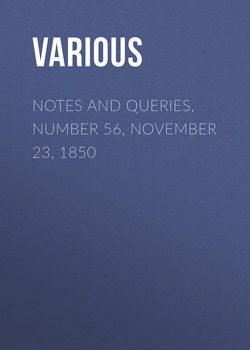Читать книгу Notes and Queries, Number 56, November 23, 1850 - Various - Страница 3
NOTES
SAMUEL ROWLANDS, AND HIS CLAIM TO THE AUTHORSHIP OF "THE CHOISE OF CHANGE."
ОглавлениеMr. T. Jones in "NOTES AND QUERIES" (Vol. i., p. 39.), describing a copy of The Choise of Change in the Chetham Library, unhesitatingly ascribes its authorship to the well-known satirist, Samuel Rowlands, whom he says, "appears to have been a Welshman from his love of Triads." Mr. JONES'S dictum, that the letters "S.R.," on the title-page "are the well-known initials of Samuel Rowlands," may well, I think, be questioned. Great caution should be used in these matters. Bibliographers and catalogue-makers are constantly making confusion by assigning works, which bear the initials only, to wrong authors.
The Choise of Change may with much more probability be given to a very different author. I have a copy of the edition of 1598 now before me, in which the name is filled up, in a cotemporary hand, S[imon], R[obson]. And I find in Lowndes' Bibliographer's Manual, that the work in question is entered under the latter name. The compiler adds,—"This piece is by some attributed to Dr. Simon Robson, Dean of Bristol in 1598; by others, most probably erroneously, to Samuel Rowland." An examination of the biography of Dr. Robson, who died in 1617, might tend to elucidate some particulars concerning his claim to the authorship of this and several other works of similar character.
Samuel Rowland's earliest publication is supposed to have been The Betraying of Christ, &c., printed in 1598. If it can be proved that he has any claim to The Choise of Change (first printed in 1585), we make him an author thirteen years earlier. In the title-page of the latter, the writer, whoever he was, is styled "Gent and Student in the Universitie of Cambridge." This is a fact of some importance towards the elucidation of authorship and has, I believe, escaped the notice of those writers who have touched upon Samuel Rowland's scanty biography. But I can hardly conceive that either of the publications above alluded to came from the same pen as Humours Ordinarie, Martin Mark-all, The Four Knaves, and many others of the same class, which are known to have been the productions of Samuel Rowlands.
Respecting Samuel Rowlands it may be regarded as extraordinary that no account has been discovered; and though his pamphlets almost rival in number those of Greene, Taylor, and Prynne, their prefaces—those fruitful sources of information—throw no light upon the life or circumstances of their author. The late Mr. Octavius Gilchrist considered that "Rowlands was an ecclesiastic [?] by profession;" and, inferring his zeal in the pulpit from his labours through the press, adds, "it should seem that he was an active servant of the church." (See Fry's Bibliographical Memoranda, p. 257.) Sir Walter Scott (Preface to his reprint of The Letting of Humours Blood in the Head Vaine) gives us a very different idea of the nature of his calling. His words are:
"Excepting that he lived and wrote, none of those industrious antiquaries have pointed out any particulars respecting Rowland[s]. It has been remarked that his muse is seldom found in the best company; and to have become so well acquainted with the bullies, drunkards, gamesters, and cheats, whom he describes, he must have frequented the haunts of dissipation in which such characters are to be found. But the humorous descriptions of low-life exhibited in his satires are more precious to antiquaries than more grave works, and those who make the manners of Shakspeare's age the subject their study may better spare a better author than Samuel Rowlands."
The opinions of both these writers are entitled to some respect, but they certainly looked upon two very different sides of the question. Gilchrist's conjecture that he was an ecclesiastic is quite untenable, and I am fully inclined to agree with Sir Walter Scott, that Rowlands' company was not of the most select order, and that he must often have frequented those "haunts of dissipation" which he so well describes in those works which are the known production of his muse.
EDWARD F. RIMBAULT.
